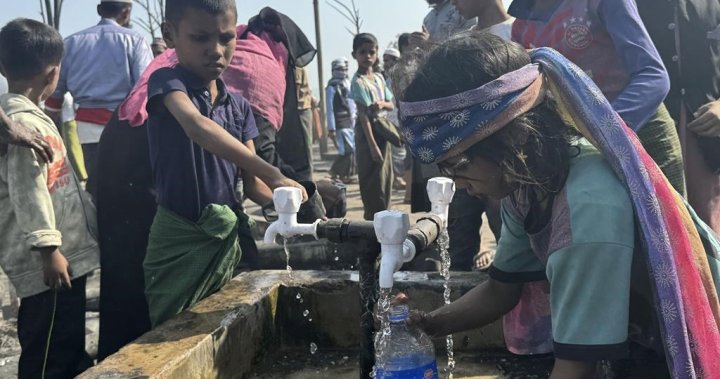Canada’s strategy for supporting Rohingya people as they continue to suffer in refugee camps in Bangladesh and face ethnic violence in Myanmar is being criticized as it expires. Bob Rae, Canada’s ambassador to the United Nations, has been a vocal advocate for continued support for the Rohingya community. The crisis began in 2017 when violent attacks on Rohingya Muslims by Buddhist extremists in Myanmar forced nearly one million people to flee to refugee camps in Bangladesh. Canada launched a strategy in 2018 to provide aid to the Rohingya, but as the situation continues to deteriorate, advocates are calling for a reevaluation of Canada’s approach.
The world’s largest refugee camp in Cox’s Bazar, Bangladesh, is home to many Rohingya people living in poor conditions with limited access to resources and employment opportunities. The lack of permanent structures has led to outbreaks of diseases, and many Rohingya have resorted to risky journeys to other countries in search of better prospects. The situation in the camp is worsening, as donor funding and services are decreasing, leaving the Rohingya community vulnerable and in need of continued support. Despite facing these challenges, there was no mention of the Rohingya crisis in Canada’s recent federal budget, raising concerns among advocates about the future of Canada’s aid efforts.
Canada’s response to the crisis has been characterized by humanitarian aid and diplomatic efforts to hold the Myanmar military junta accountable for their actions. Bob Rae, who leads a multi-nation working group on Myanmar at the UN, stresses the importance of establishing a democratic government through elections in Myanmar to facilitate the repatriation of Rohingya refugees. However, the military junta has received support from countries like China and Russia, complicating efforts to address the crisis. Canada is urged to do more to support the Rohingya community, including focusing on development work that can empower them and help address the root causes of their displacement.
Jaivet Ealom, head of the Rohingya Centre of Canada, has criticized Canada for not utilizing all available tools to support the Rohingya community, including better coordination between federal departments and increased engagement with the Rohingya diaspora. He highlights the need for educational opportunities for Rohingya youth in the refugee camps to prevent them from joining armed groups due to a lack of prospects. Ealom argues that Canada should reassess its strategy based on what is working effectively on the ground in order to provide meaningful support to the Rohingya community. Despite the challenges, efforts are ongoing to address the crisis, with a focus on holding the Myanmar military junta accountable and supporting initiatives that benefit the Rohingya community.
Canada’s approach to the Rohingya crisis also faces challenges in engaging with the government of Bangladesh, which has imposed restrictions on the Rohingya population within the camps, limiting their access to education and employment opportunities. Bob Rae acknowledges the difficulties in working with the Bangladesh government to improve conditions for the Rohingya community, particularly in terms of empowerment and development initiatives. However, Bangladesh argues that allowing Rohingya to participate more freely in economic activities outside the camps would negatively impact the local host community. There is a need for greater collaboration and dialogue between Canada, Myanmar, Bangladesh, and other stakeholders to find sustainable solutions to the crisis and support the Rohingya community in the long term.
Advocates and humanitarian organizations stress the urgency of ongoing support and intervention for the Rohingya community, as the crisis continues to evolve and worsen. Global governments, including Canada, are called upon to step up their efforts to address the root causes of the crisis, provide essential services and resources to the Rohingya in refugee camps, and push for accountability for the atrocities committed by the Myanmar military junta. As the situation in Myanmar and Bangladesh remains complex and challenging, a coordinated and comprehensive approach is needed to ensure the safety, well-being, and dignity of the Rohingya people as they seek justice and a future free from violence and persecution.


